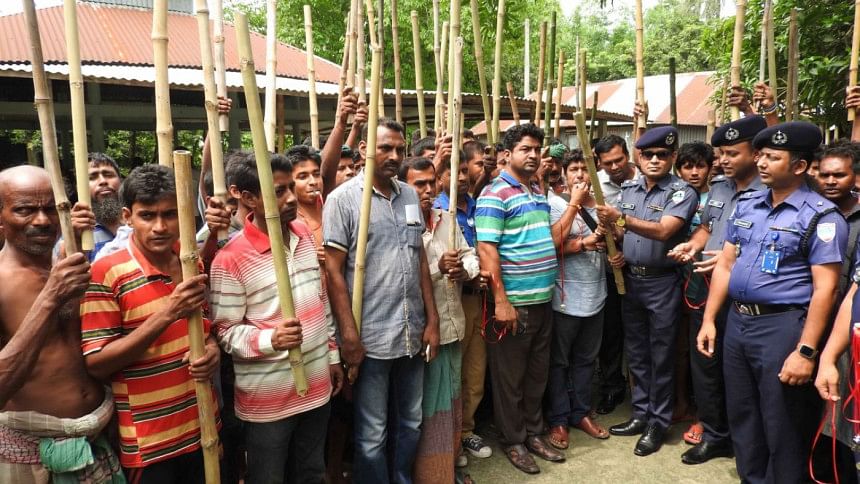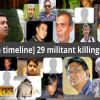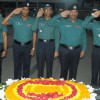Extremism and the bamboo brigade

Of late we have seen pictures of the police handing over bamboo sticks to groups of people in various districts ostensibly for the purpose of combating militancy and extremism in the country. The unique step was motivated by the spate of targeted killings. The most recent of the bamboo distribution ceremony happened in Jessore where the comments of the senior most police officer present there are very interesting and merits quoting and scrutiny.
He excoriated some "intellectually dishonest persons" for criticising the so called "Lathi-Bashi Defence Party," initiative to create resistance in the wards and villages and fell back on history to extol the virtues of the bambusa and its efficacy in driving the British and the Pakistanis out of the country. Before going any further it is well for the sake of history to remind ourselves that it was not bamboo that drove the Brits or the Pakistanis out of this country but much more than that.
The reaction from any person with the slightest comprehension of extremism, terrorism or militancy to any such move as a means of counteraction would be of dismay if not trepidation. One may be forgiven for conjuring up in one's mind the spectre of vigilante groups that were formed in various countries to stave off political or ideological opponents. The JMB is perhaps a close comparison when a religious group was sponsored to go after the leftists in some parts of the country with the connivance of the administration. Of course that was done rather clandestinely with a partisan political objective in mind. In this particular case the intention of the police is pious, the object appropriate, but the means appears to be rather mislaid. Everyone has the right to self defense and this may provide some comfort individually but one is doubtful whether that will effectively combat the killers.
The current initiative, apart from exposing the inability of the system to cope with a particular situation, leaves many unanswered questions. How will those armed with sticks operate, as a group or an individual? Who is in charge of the group? Will the sticks be carried on person at all times? Will they be working singly or in groups, and if both in day and night? Remember all the killings in 2016 were carried out in broad daylight, many of them in a public place.
Regrettably, the police has made the cardinal misjudgment of looking at the phenomenon that the country is facing as merely a law and order issue. The "Lathi-Bashi Defence Party," as the initiative has been described, may protect against criminals but will that be able to effectively combat the violent radicals whose acts may appear criminal but who, unlike the criminals, are driven by religious-political motives. This is where a deeper understanding of the threat is required by the security agencies, particularly the police who remain at the forefront of the country's fight against extremism and terrorism.
There is need to understand the reasons why the phenomenon has appeared and what the ultimate motive of this group is. And are the killings a tactic only or that is the broad strategy, given that terrorism and violence can both be a tactic and strategy of a non-state actor in its bid to attain a political objective. Not all violence constitutes terrorism though all terror groups resort to violence. Without a rational analysis of the situation the counter actions will be flawed and ineffective.
What kind of template should one put the current killings into. Are these the acts of extremist group(s) with the ideological motivation to go after those, particularly their coreligionists, who they believe do not conform to their way of thinking, without any illusion to power? The only aim is to curb expression of differing views of religion through fear and intimidation if not compelling the detractors to fall in line with them. But if that is the case then how does one explain the fact that none of the Hindu, Christian or Buddhist victims of the recent attacks is known to have ever expressed anything derogatory of other religions, leave alone Islam.
Another view is that the killings are spurred by the current state of politics where the political space for the opposition has shrunk. Thus these acts are motivated entirely by political considerations. The purpose is to embarrass and destabilise the government by showing it up as being incapable of providing security to the common man, and by targeting the minority communities elicit international attention as has been so palpable in the comments of our friends. The objective is to precipitate a situation that would compel a change in the country's political dispensation that may prove favourable to the interest of this group.
But whatever may be the motivations, organising people armed with bamboo sticks is not a response that alone would be able to combat the perpetrators effectively.
The writer is Associate Editor, The Daily Star.

 For all latest news, follow The Daily Star's Google News channel.
For all latest news, follow The Daily Star's Google News channel. 








Comments